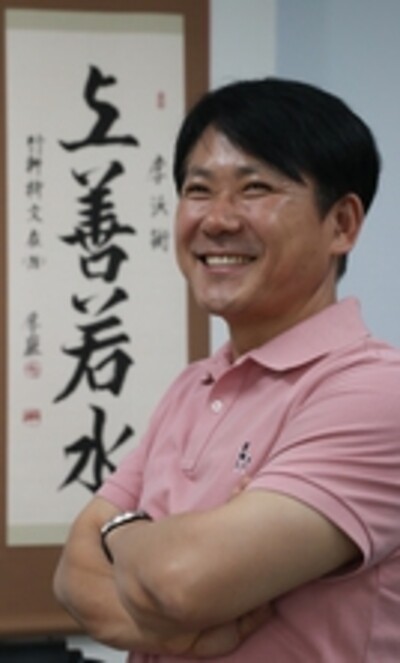hankyoreh
Links to other country sites 다른 나라 사이트 링크
S. Korean lawyer fights for forced labor victims in Japan

Lee Sang-gap’s connection with Koreans drafted for forced labor at Mitsubishi Heavy Industry during Japan’s colonial occupation goes back to 2009, during his 11th year working as a lawyer. Japanese lawyers and NGO members had been visiting South Korea in support of lawsuits by victims of forced labor. Lee learned about that from a newspaper reporter while he was the head of the Gwangju chapter of MINBYUN-Lawyers for a Democratic Society.
Lee recalled feeling a sense of shame. If Japanese attorneys going to such lengths to help Koreans, he thought, surely Korean attorneys should be doing the same. So when a local NGO organized a one-person demonstration in front of a dealership for Mitsubishi automobiles, calling for compensation to be paid to the victims of forced labor, Lee took part.
In June 2010, Lee went to Tokyo with about 20 NGO representatives. It was a discouraging moment in the campaign: the plaintiffs had lost their case in a district court, on appeal, and at the Supreme Court. Unwilling to give up their efforts, Lee and the others formed a ceremonial procession in front of the headquarters of Mitsubishi, where the general meeting of stockholders was being held — after every three steps, they would prostrate themselves on the ground.
“We hadn’t expected very much, but to our surprise we were contacted by Mitsubishi with an offer to negotiate,” Lee said. Seventeen rounds of negotiations were held through 2012, but the two sides ultimately failed to reach an agreement because Mitsubishi was determined to provide indirect assistance, such as creating a scholarship fund, rather than direct compensation.
Then in May 2012, the South Korean Supreme Court ruled for the first time that Nippon Steel and Sumitomo Metal was obliged to compensate forced labor victims. That opened a path to legal relief. Lee filed another lawsuit in South Korea, which culminated in victory at the Supreme Court in November 2018.
Lee had expected the ruling would put the plaintiffs in a better position to negotiate with Mitsubishi, but his expectations have been frustrated by fierce opposition from the Japanese government, he said, smiling sadly.
By Park Byong-su, editorial writer
Please direct comments or questions to [english@hani.co.kr]

Editorial・opinion
![[Column] Park Geun-hye déjà vu in Yoon Suk-yeol [Column] Park Geun-hye déjà vu in Yoon Suk-yeol](https://flexible.img.hani.co.kr/flexible/normal/500/300/imgdb/original/2024/0424/651713945113788.jpg) [Column] Park Geun-hye déjà vu in Yoon Suk-yeol
[Column] Park Geun-hye déjà vu in Yoon Suk-yeol![[Editorial] New weight of N. Korea’s nuclear threats makes dialogue all the more urgent [Editorial] New weight of N. Korea’s nuclear threats makes dialogue all the more urgent](https://flexible.img.hani.co.kr/flexible/normal/500/300/imgdb/original/2024/0424/7317139454662664.jpg) [Editorial] New weight of N. Korea’s nuclear threats makes dialogue all the more urgent
[Editorial] New weight of N. Korea’s nuclear threats makes dialogue all the more urgent- [Guest essay] The real reason Korea’s new right wants to dub Rhee a founding father
- [Column] ‘Choson’: Is it time we start referring to N. Korea in its own terms?
- [Editorial] Japan’s rewriting of history with Korea has gone too far
- [Column] The president’s questionable capacity for dialogue
- [Column] Are chaebol firms just pizza pies for families to divvy up as they please?
- [Column] Has Korea, too, crossed the Rubicon on China?
- [Correspondent’s column] In Japan’s alliance with US, echoes of its past alliances with UK
- [Editorial] Does Yoon think the Korean public is wrong?
Most viewed articles
- 1‘We must say no’: Seoul defense chief on Korean, USFK involvement in hypothetical Taiwan crisis
- 2N. Korean delegation’s trip to Iran shows how Pyongyang is leveraging ties with Moscow
- 346% of cases of violence against women in Korea perpetrated by intimate partner, study finds
- 4[Column] Park Geun-hye déjà vu in Yoon Suk-yeol
- 5‘Weddingflation’ breaks the bank for Korean couples-to-be
- 6Will NewJeans end up collateral damage in internal feud at K-pop juggernaut Hybe?
- 7Amnesty notes ‘erosion’ of freedom of expression in Korea in annual human rights report
- 8[Interview] Dear Korean men, It’s OK to admit you’re not always strong
- 9Korean government’s compromise plan for medical reform swiftly rejected by doctors
- 10[Editorial] Japan’s rewriting of history with Korea has gone too far